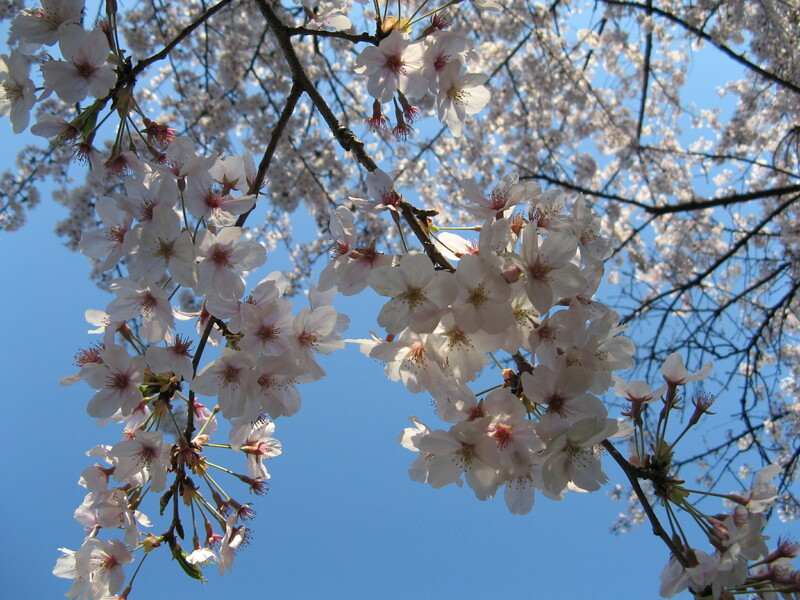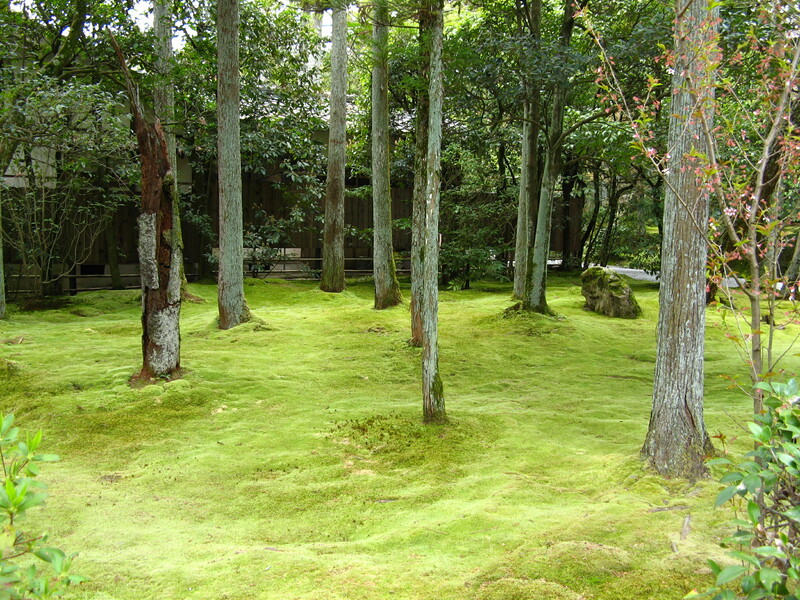Speaking Japanese

Cherry flowers, Kariya |
Like most other things Japanese, the Japanese language is in a class of its own. It's often compared to Korean, but whether the two are or are not related is disputed. It is also sometimes linked to the Altaic family (consisting of languages such as Turkish and Mongolian), but this is even more disputed. In any case, Japanese is sufficiently different from the languages westerners are used to that composing a simple sentence (like, say, "what is the name of this beer?") requires significant mental effort for the beginner.
Phonetics
The sound system, however, is very simple, and presents no obstacles for anyone. There are just five vowels (aeiuo) and just 20 or so consonants, all of them very common. There are no tones (unlike in Chinese, Thai, and Vietnamese, which are unrelated to Japanese), and in general consonants are not allowed next to one another, or at the end of a word. (Looking at any table of the kana syllabaries will show you the allowed combinations at a glance.) The result is a vowel-dominated language with no difficult sounds. Another result is that to outsiders names tend to seem very similar.
A side-effect is that all loanwords have to be squeezed through this round hole, and in consequence are generally mangled beyond recognition. One example is "toast," which the Japanese had to modify to be able to write and speak. The initial "to" is fine, but "oa" didn't appeal to the Japanese, so they just dropped the "a". The "st" is not allowed in Japanese, so they padded it with a "u" (pronounced "oo") in the middle. And as "t" cannot be a final consonant in Japanese an "o" was added at the end. The result, "tosuto", is something that is not easily associated with the original "toast". Similarly, "steak" became "suteki", "baseball" "besuboru," and "coin locker" "koin roka".
As you may have guessed from the examples above, the letters "l" and "r" cause particular problems for the Japanese. Japanese has neither sound, but instead something in between, which means that most Japanese cannot distinguish between these two sounds. This has actually been verified by various studies. A tourist in Japan needs no studies to see this, however. After reading enough signs for "flesh juice", "gllilled fish", and "cleam bruree", the tourist draws his own conclusions...
Grammar

Screen doors in temple, Takahama |
The grammar, on the other hand, is rather more challenging, being very unlike that of the Indo-European languages most westerners are used to. The word order, for example, is generally subject-object-verb (I it like), as opposed to the subject-verb-object (I like it) of English. This is just a minor obstacle, however.
A typical simple sentence (and probably about the most complex sentence I can compose) might be "kore biru no namae wa nan des ka?". Translated literally word-for-word it would be "this beer 's name wa what is ka?". The "no" is similar to "'s" in English (or perhaps even more to "of", but with the word order reversed). The "wa" indicates that the preceding is the subject of the sentence, and the final "ka" indicates that this is a question. (It's often said that Japanese has no articles, and while this is true, it has lots of particles, like "no", "wa", and "ka".)
Another unusual thing about Japanese is that verbs have four basic forms: present positive, present negative, past positive, and past negative. All English verb forms are positive, whereas negative basically means negation. In other words, negation is not indicated with a special word (like the English "not"), but by inflecting the verb. This is perhaps most easily shown with a table.
| Present | Past | |
|---|---|---|
| Positive | Tabemas eat | Tabemashita eaten |
| Negative | Tabemasen not eat | Tabemasen deshita not eaten |
In other words, "ji-biru wa koko arimas ka?" means "is there any ji-biru (Japanese microbrew) here?". ("Arimas" is "exists" and "koko" is "here".) The answer might be "hai, ji-biru arimas" (yes, ji-biru exists [here]) or "iie, ji-biru arimasen" (no, ji-biru does not exist [here]).
Politeness
There are many more forms, but this is the basics. Rather surprisingly, many of the other forms are used to indicate levels of politeness. In Japanese politeness is built into the language to a degree that seems scarcely believable to a westerner (and no doubt the Japanese react the same way to western languages).

Temple against the sky, Kyoto |
In Japanese, "how are you?" would be "o-genki des ka?". Explaining how this sentence works, however, is a bit tricky. "Genki" means something like "healthy" or "strong". "Des" is easy: just normal "is". And "ka" we've seen already. But where is the subject? What we've translated so far just means "healthy is?". The "o-" is of course the answer, but in an unexpected way. "O-" is a general polite prefix used in Japanese to indicate respect towards someone or something. This is often translated into English along the lines of "Honourably well is?", but that doesn't really work. There is no real equivalent in English.
Most readers at this point are probably no nearer to seeing how "o-" can tell us what the subject of the sentence is, but it is conventional in Japan to be scrupulously polite towards others, and deprecating towards oneself. It follows that if someone asks "healthy-very-politely is?", they are not talking about themselves, because they wouldn't be polite to themselves. Consequently, the subject must be the person spoken to.
In ancient aristocratic Japanese it was generally considered impolite to explicitly indicate subjects and objects in sentences, and so both were indicated by means of endless subtle gradations of politeness. In fact, the entire Tale of Genji is written in this fashion, and, as the translator writes "only to someone who has never known anything else can the effort [of following these 'subtle shifts in honorific level'] be other than taxing and arduous." This is no longer the case, but the same principle is still used in modern Japanese.
Complexity
One area most people would not expect complexity in is counting, and indeed the basics of Japanese counting are straightforward, using the good, old base-ten system. So: "ichi ni san ... kyu ju ju-ichi ju-ni ju-san ... ju-kyu ni-ju ni-ju-ichi ..." is "1 2 3 ... 9 10 11 12 ... 19 20 21 ..." Unfortunately, it's not really that simple. Japanese has many different sets of counting words for different classes of objects. The above are the basic ones, but there are special ones for people, small animals, big animals, bound objects (like books), long thin things (like pencils) and so on.
Initially, I was horrified to learn about this, because it seemed so utterly pointless. Why should anyone have to memorize all this? It clearly serves no purpose (English manages just fine without), so why bother? Later it struck me that my own native language (Norwegian) has a much worse example of pointless linguistic complexity. I'm referring to the genders of nouns, of course. In Norwegian, as in German, there are three genders, conventionally referred to as male, female and neuter, and every proper noun belongs to exactly one of these classes. Thus, in Norwegian, bicycles are male, books are female, and houses are neutral.
This is much worse than it may sound at first, because it means that in order to be able to say "a book" or "the book" you first have to know the gender of "book", and very little logic exists to tell you what is correct. And if you get it wrong the result sounds very odd, or even comic, to native speakers. The worst of it is that nouns are easily the most numerous class of words in Norwegian and German, which means that you have to memorize this for literally thousands of words.
If you are wondering what the point of this might be, you can just stop at once, because there is none. English, a very similar language, manages just fine without this system. And in my three decades of speaking Norwegian I cannot remember a single instance in which this redundancy has been of the slightest use to anyone that I know of.
With time I've come to regard both the counting numbers and the concept of gender as examples of the sort of pointless complexity that seems to naturally create itself in any natural language. (I am, you are, he/she/it is? What's the point of that?) And I guess that's the real lesson here. Japanese seems strange to us, but only because it is foreign. English must seem equally bizarre to outsiders.

Moss garden, Kyoto |
Similar posts
Writing Japanese
If speaking and understanding Japanese seems difficult, that's nothing compared to reading and writing it
Read | 2007-07-31 21:53
Japanese beer
Japan is not, of course, a country with any great beer tradition to speak of, and so one may be forgiven for thinking that it's all a dreary swamp of bland pale industrial lager
Read | 2007-06-04 20:52
Comments
Marc de Graauw - 2007-08-06 11:34:17
"in my three decades of speaking Norwegian I cannot remember a single instance in which this redundancy has been of the slightest use to anyone that I know of"
"I've come to regard both the counting numbers and the concept of gender as examples of the sort of pointless complexity that seems to naturally create itself in any natural language"
Redundancy in language has a very clear goal - it allows you to understand what is said even if some of the signal is lost in background noise (from the sabre-tooth tiger chasing us, for instance). I know redundancy has been proven to work well in written language (it's easy to read text with all vowels removed etc.) and can imagine seemingly redundant cruft serves a similar purpose in spoken language.
Lars Marius - 2007-08-08 10:14:12
For redundancy in general I agree that it's useful, although I think in spoken language much of it is often left out in the interests of brevity.
Still, that doesn't mean that any particular example of redundancy is necessarily useful. I've been consciously looking for examples of the gender redundancy in Norwegian being useful for a couple of years now, and so far I have nothing...
MikkaBouzu - 2007-11-04 18:33:47
"kore biru no namae wa nan des ka?" What is the name of this beer?
I'm afraid that there is a slight error in this sentence...
'Kore' is the noun form of the word which is translated to English as "this" (as in, "This is an Asahi beer," kore wa asaki bi-ru desu.) ; however, if one wants to modify another noun with it, one must change it to the adjectival form "Kono."
So the correct sentence is: Kono bi-ru no namae wa nan des' ka? このビールの名前はなんですか。
The other such inflections are as follows:
Noun Adj.
"This" Kore Kono
"That" Sore Sono
"That"(Over there) Are Ano
"Which?" Dore? Dono?